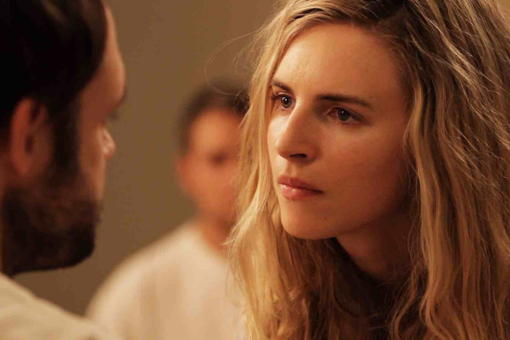By Jim Rohner · April 30, 2012

Ambiguity doesn't have to be a bad thing. Films with ambiguous endings to go along with opaque narratives can often generate the best discussions over diverse interpretations. Before its elucidated 2005 Director's Cut, Donnie Darko was one of the most provocative films of the decade, blending intimate psychology with mild science-fiction and leaving subtle hints that likely meant one thing to Richard Kelly, but could also easily justify an entirely different reading from someone else.
Though sharing very few other similarities, Sound of My Voice echoes the spirit of Donnie Darko in creating an intimate character study set against the backdrop of a science-fiction context that incites the main narrative without demanding too much attention be paid to it. It's time travel raising question marks in Sound of My Voice with young couple Peter Aitken (Christopher Denham) and Lorna Michaelson (Nicole Vicius) infiltrating and investigating a cult whose leader, Maggie (Brit Marling), claims to have traveled back in time from the year 2054 to provide some form of salvation from some form of cataclysmic event.
Such a claim raises one question – is she or is she not telling the truth – and it's a question to which both Peter and Lorna are unified in their response. We, the audience, are also unified in our response because Sound of My Voice exists not in a world where a young teen sees visions of a man in a bunny suit prognosticating the end, but in a world where charismatic speakers like David Koresh and Jim Jones have filled voids in their followers' lives en route to convincing them to kill others and themselves.
Through 10 numbered "chapters" we are told the story of Peter and Lorna's infiltration, shown how powerful both Maggie's grace and anger can be, witnesses to how one of the protagonists becomes unwillingly and unexpectedly affected by the alleged time traveler's probing and healing. With each secret meeting, occurring in an undisclosed, neutral-colored basement and entered only after the exchanging of an elaborate handshake, Maggie dispenses inspirational learnings to her pajama-clad followers. She is beautiful, she is wise, she has immediate answers to all questions asked of her, even those that challenge her claims. But while her wisdom largely goes unchallenged, lingering doubts still remain. Doesn't the inspirational jargon she spouts sound similar to that of many other existing ideologies? Aren't her answers just generic enough to always superficially satisfy her faithful followers? Isn't it convenient that she never reveals specifics about the how or why she ended up in our time?
While Maggie teases and tests Peter and Lorna, we are teased by the sparsest interjections of peripheral characters whose motivations are equally mysterious. There's 8-year old Abigail Pritchett (Avery Pohl), a student in Peter's class who is seen either building looming structures in her room with black building blocks or getting an injection from an adult, male guardian whose relationship with her is unclear. There's also Carol Briggs (Davenia McFadden), a Department of Justice employee who seems to know a lot about Maggie, but who reveals very little about herself. Who are these characters and what do they have to do with Maggie?
Sadly, that question, along with many others, are not even close to answered in the film's 85-minute running time that ends on the unearned ambiguity of a dangling thread. As I said, there is nothing inherently wrong with ambiguity in a film, even in a film's ending, but leaving things open ended or inconclusive only works when the film has laid out enough of a blue print to lead to speculation about and interest in the ultimate outcome. There are certainly moments and images that are provocative – why is Abigail so insistent with those building blocks? Why was Lorna given instructions on how to handle a hand gun? – but because they seem so random and their importance is neither immediately nor even eventually addressed, they feel disconnected from the main narrative, resulting in a splintered and frustrating viewing experience.
The filmmakers, co-writer/star Marling and co-writer/director Zal Batmanglij, have alluded to the fact that these loose threads will be tied up at a later date in the form of perhaps a sequel, or a TV series, or web series. The flaw in that plan is that it relies on enough interest for people to want to see how the story evolves, but they've shot themselves in the foot by overplaying the mysterious at the expense of the tangible. No doubt Marling and Batmangjil are truthful when they say that the subtle hints they laid ultimately factor into a larger picture that has yet to be painted, but seeing as there's only one scene – coming immediately before the film's end – that directly serves this larger picture, there's just not enough of a dangled carrot to see the story to whatever planned fruition there may be.
It's a shame that this is the case because Sound of My Voice contains some truly powerful character moments especially surrounding the interactions between Maggie, Peter and Lorna. The details of some of those interactions will not be spoiled here, but they are as effective as they are because the performances from all three actors exceptional, including Brit Marling, who skillfully fluctuate between precociousness, intimidation and tenderness at the drop of a hat. The emotions she evokes from both Peter and Lorna and the conflict she creates between them is a frightening examination of human psychology and how people's emotional wounds can be filled with the right (wrong?) words being offered. Yet these moments are undercut by the fact that the relatively little that we know about our protagonists – told through VHS style flashbacks voiced by an unidentified narrator – is obligatory for the narrative yet hackneyed in the unveiling. In the end, Sound of My Voice leaves very little echo.